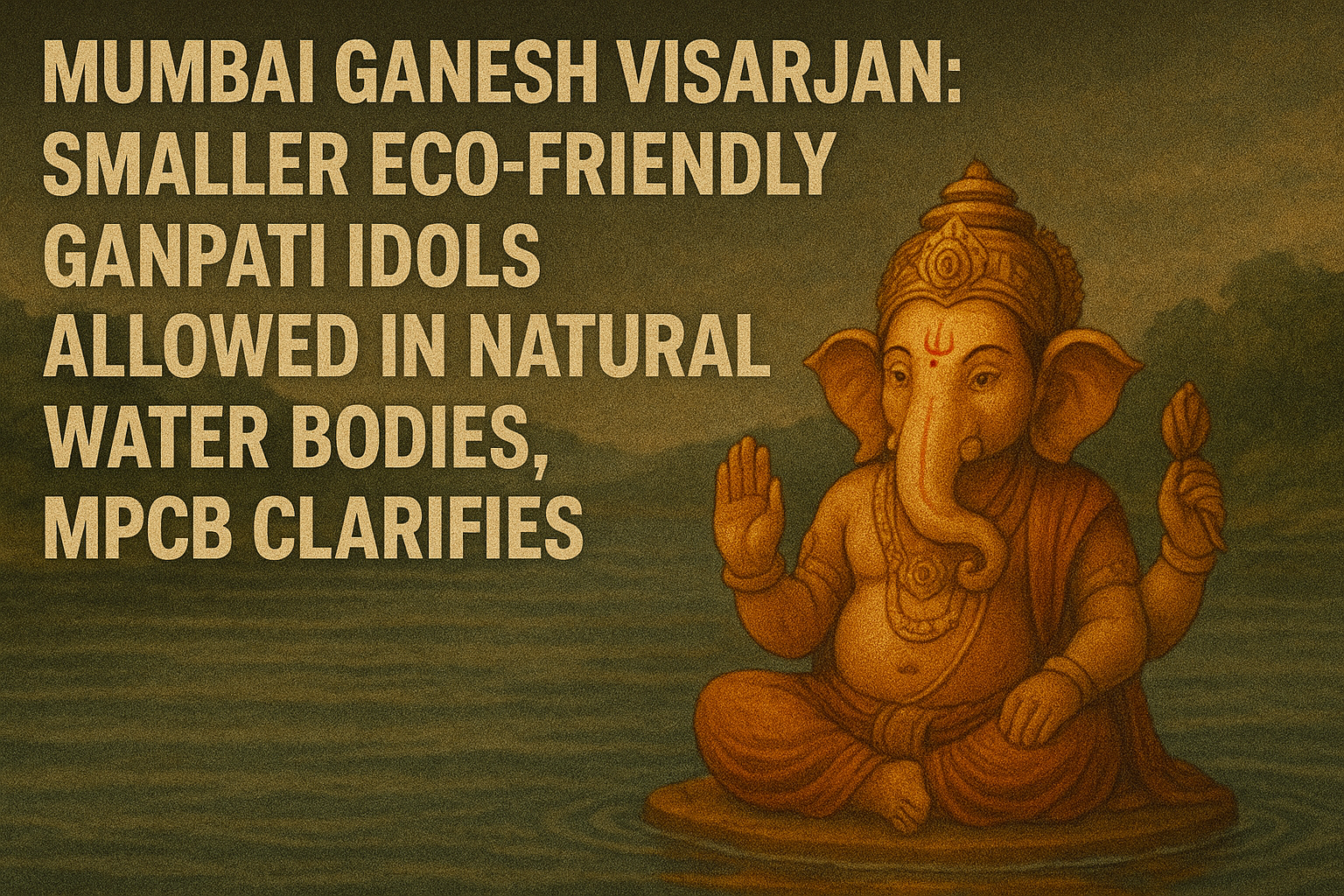
Mumbai Ganesh Visarjan: Smaller Eco-Friendly Ganpati Idols Allowed in Natural Water Bodies, MPCB Clarifies
Mumbai is gearing up for Ganesh Visarjan, and this year the Maharashtra Pollution Control Board (MPCB) has issued an important clarification. In a circular dated August 26, MPCB confirmed that smaller eco-friendly Ganpati idols, under six feet in height, can be immersed in natural water bodies such as seas, rivers, and lakes. However, idols made of Plaster of Paris (PoP), even if under six feet, must only be immersed in artificial ponds created by local authorities.
This decision comes as a relief to many Ganesh mandals and devotees, particularly those from historic mandals across Mumbai, who had expressed concerns over restrictions on immersions of smaller idols.
Eco-Friendly Idols Get Green Signal
The MPCB’s latest circular makes a clear distinction between clay idols and PoP idols. While clay idols are considered environment-friendly and safe for natural water bodies, PoP idols pose a severe threat to aquatic life and water quality due to their chemical content.
MPCB’s spokesperson Sanjay Bhuskute explained, “Immersion of clay idols in natural water bodies is allowed in areas where artificial pond systems are not available. Municipal corporations have already been informed of this guideline.”
This clarification follows requests from the Brihanmumbai Sarvajanik Ganeshotsav Samanvay Samiti, which had sought relaxation of rules for smaller eco-friendly idols. The Samiti highlighted that devotees were disappointed during the early days of the festival when clay idols were restricted only to artificial ponds.
Historic Mandals Voice Concerns
Prominent Ganeshotsav mandals, including Girgaon’s 132-year-old Keshavji Naik Chawl Ganpati, Shastri Hall, and Navroji Wadia Street Ganpati, had raised the issue. Samiti President Naresh Dahibhawkar noted that during the second day of the festival, many devotees stood in long queues at artificial ponds, leading to crowding and dissatisfaction.
The mandals emphasized that smaller idols made of clay, which naturally dissolve in water, should be permitted for immersion in traditional visarjan spots like Girgaon Chowpatty and Banganga Lake. The MPCB’s clarification has now provided relief to these long-standing mandals and their devotees.
BMC to Follow MPCB Guidelines
When asked about Mumbai’s implementation, Prashant Sapkale, Deputy Municipal Commissioner and BMC’s Ganeshotsav Coordinator, said, “We will follow MPCB guidelines.”
This means that in Mumbai, while artificial ponds remain the primary focus for visarjan to reduce pollution, clay idols below six feet can be immersed in natural water bodies where such ponds are unavailable.
Artificial Ponds in Mumbai
The Brihanmumbai Municipal Corporation (BMC) has made significant efforts this year to promote eco-friendly immersions. A total of 288 artificial ponds have been installed across different wards in the city.
Some of the wards with the highest number of artificial ponds include:
- G-South (Worli): 24 ponds
- E ward (Byculla): 20 ponds
- R-South (Kandivali): 18 ponds
- F-South (Parel): 17 ponds
- S ward (Bhandup): 15 ponds
- P-South (Goregaon): 14 ponds
These ponds are designed to ensure that idols can be immersed respectfully while reducing the impact on marine ecosystems.
Eco-Friendly Celebrations
The MPCB and BMC have consistently encouraged the use of eco-friendly Ganpati idols made of natural clay, shadu mati, and biodegradable materials. Such idols not only protect water bodies from pollution but also dissolve faster, ensuring minimal environmental harm.
Over the years, awareness campaigns have been conducted to discourage the use of PoP idols, which release harmful chemicals like gypsum, sulphur, phosphorus, and magnesium into water. This year’s guidelines further strengthen the push towards sustainable celebrations.
Conclusion
The MPCB’s clarification strikes a balance between environmental protection and cultural traditions. By allowing smaller eco-friendly idols in natural water bodies while restricting PoP idols to artificial ponds, the board has addressed the concerns of both devotees and environmentalists.
With 288 artificial ponds in Mumbai and a clear focus on sustainable practices, this year’s Ganeshotsav is expected to be more eco-conscious. Devotees can now celebrate with faith and responsibility, ensuring that the joy of Ganesh Visarjan does not come at the cost of nature.





